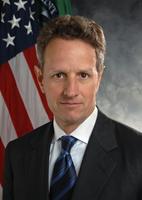The lessons from mistakes are most expensive
Adelina Marini, April 15, 2010
 However there is a big difference in whether mistakes are caused by firm beliefs or by incompetence. Bulgaria, unfortunately, has still not learned to learn from its mistakes, no matter its pretenses to be a thousand years old state. Unlike the US, who at a first glance, demonstrate readiness to learn from the failure of their own visions. A good example in support of the above is a long article by the American Secretary of the Treasury Timothy Geithner for the Washington Post, in which he explains the plans of president Barack Obama's administration for an overall reform of the American financial system.
However there is a big difference in whether mistakes are caused by firm beliefs or by incompetence. Bulgaria, unfortunately, has still not learned to learn from its mistakes, no matter its pretenses to be a thousand years old state. Unlike the US, who at a first glance, demonstrate readiness to learn from the failure of their own visions. A good example in support of the above is a long article by the American Secretary of the Treasury Timothy Geithner for the Washington Post, in which he explains the plans of president Barack Obama's administration for an overall reform of the American financial system.
In fact this is another radical reform which is turning with the lining upside down recent American philosophy that everyone must be able on their own and that this is the best way for a system of self-managing subjects to function.
In the very beginning of his article Mr Geithner makes it clear that the government in Washington has spend quite a lot of time calculating the costs of the crisis. Aside from concrete numbers, the true cost of the crisis, according to the Treasury secretary, will always be measured by the millions of lost jobs, the trillions in lost savings and the thousands of failed businesses. "No future generation should have to pay such a price".
This is why, Tim Geithner thinks, it is just unacceptable "to walk away from this recession without fixing the system's basic flaws that helped to create it".
President Obama's bill aimed at tightening financial regulation in the US is on its way to the Senate and there are indications that there is support from both parties (the Republicans and the Democrats). The basic points in the bill are the creation of an independent and accountable agency that can set and enforce clear rules of the road across the financial marketplace. This means that the agency will be both independent from the government but in the same time it will have to report to the public about its work.
Beside this, the bill gives the government authority to impose stronger requirements on capital and liquidity. It limits banks from owning, investing, or sponsoring hedge funds, private equity funds or proprietary trading operations.
A very important moment in the bill is that it makes an attempt to get rid of the rule "too big to fail", which so far has been the essence of the system. If a major firm does mismanage itself into failure, the Senate bill gives the government the authority to wind down the firm with no exposure to the taxpayer. "No more bailouts. Instead, we will have a bankruptcy-like regime where equity holders will be wiped out and the assets will be sold", the American financial minister further explains.
Ands the lesson: "A clear lesson of this crisis is that any strategy that relies on market discipline to compensate for weak regulation and then leaves it to the government to clean up the mess is a strategy for disaster", Tim Geithner writes.
Last but not least, although in the end of his article, Geithner points out that the bill would have a strong hand in negotiating a global agreement on new capital requirements by the end of the year. Such an agreement would establish a level playing field with minimum requirements for capital, and compliance would be open to scrutiny by regulators and the markets.
And the lesson for us should be that obviously the American society, which carried an enormous burden for the sake of an end of the recession, requires from its government solutions. The government finds a solution and presents it for deliberation and debate. As simple as that.
 Mario Draghi | © ECB
Mario Draghi | © ECB Vladislav Goranov, Sven Sester | © Council of the EU
Vladislav Goranov, Sven Sester | © Council of the EU Tsakalotos, Djisselbloem, Gramegna | © Council of the EU
Tsakalotos, Djisselbloem, Gramegna | © Council of the EU